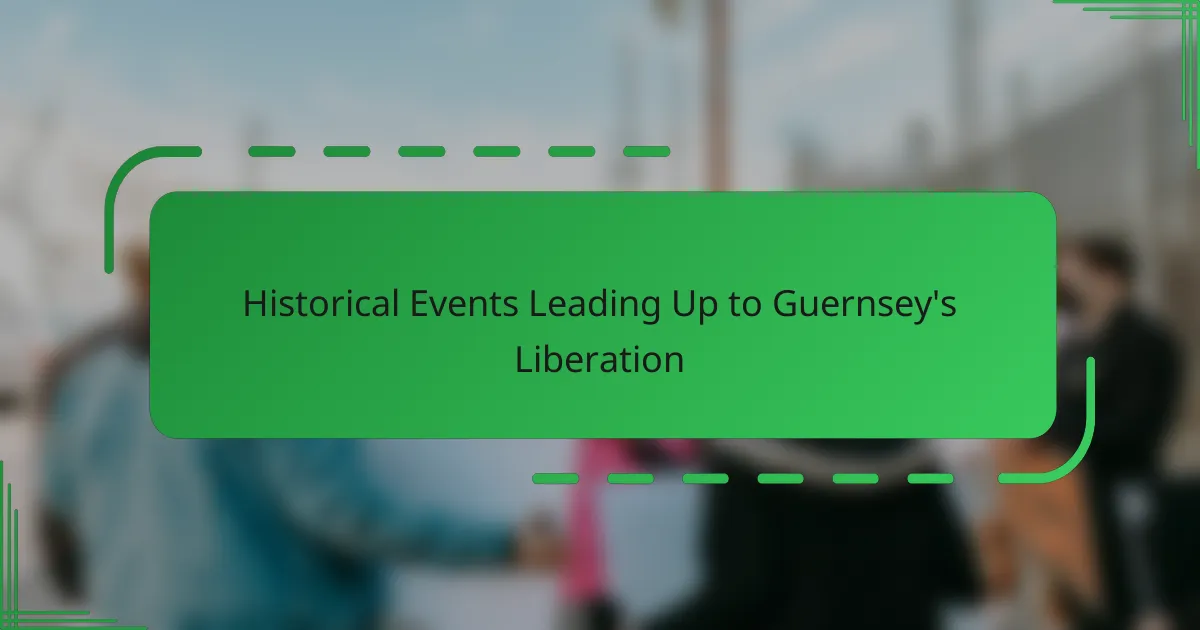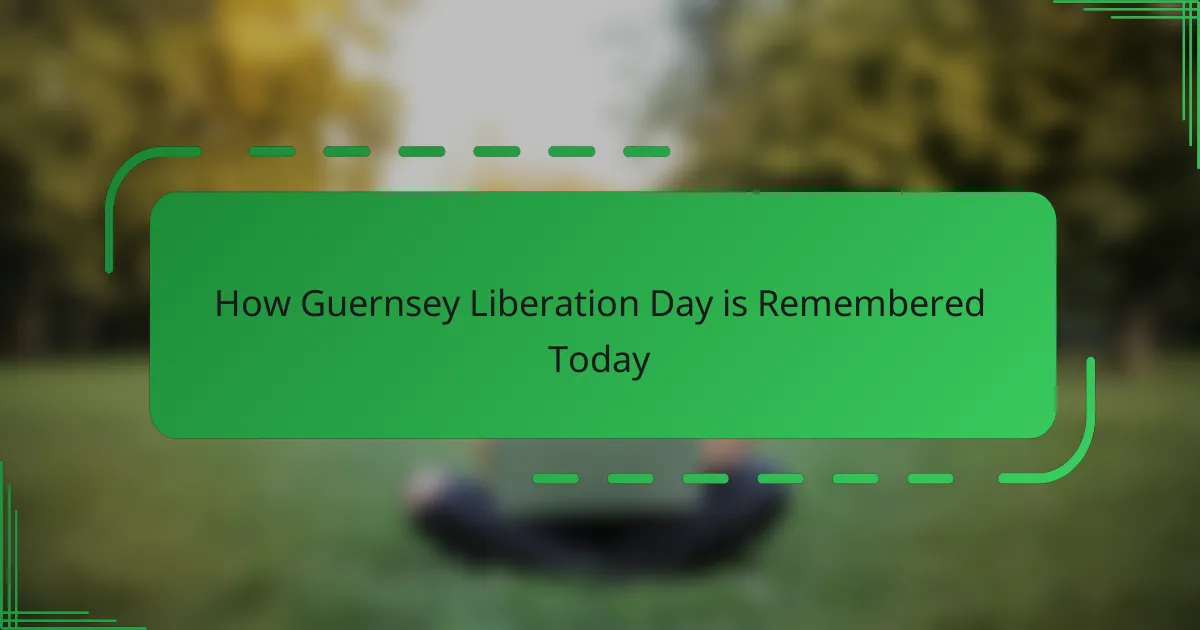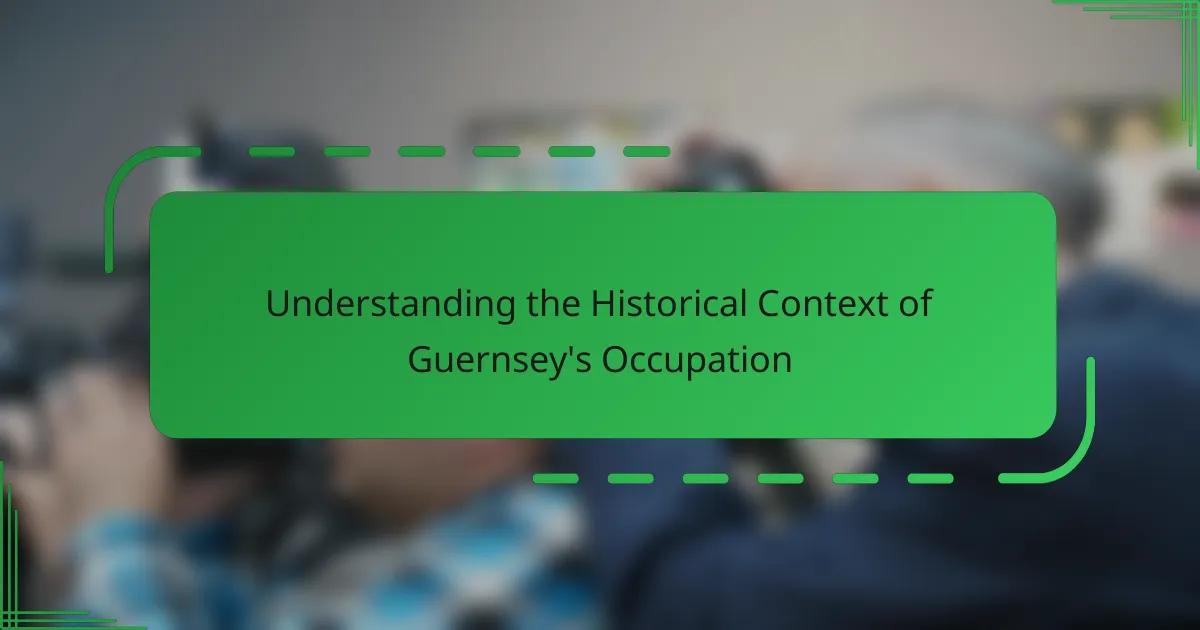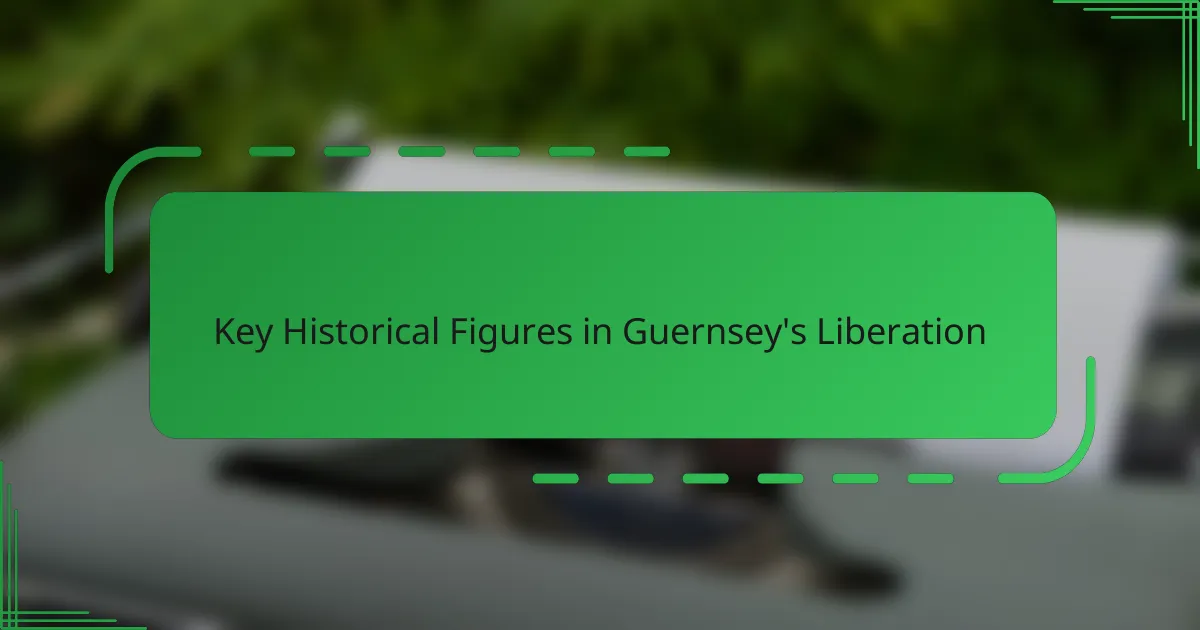The liberation of Guernsey in May 1945 was the culmination of various pivotal events, including the harsh German occupation, strategic Allied military operations, and the resilience of local resistance movements. This period profoundly transformed the island’s social and economic landscape, setting the stage for its eventual freedom. The coordinated efforts of the Allies, alongside the support from the island’s inhabitants, were instrumental in overcoming the challenges posed by the occupiers.
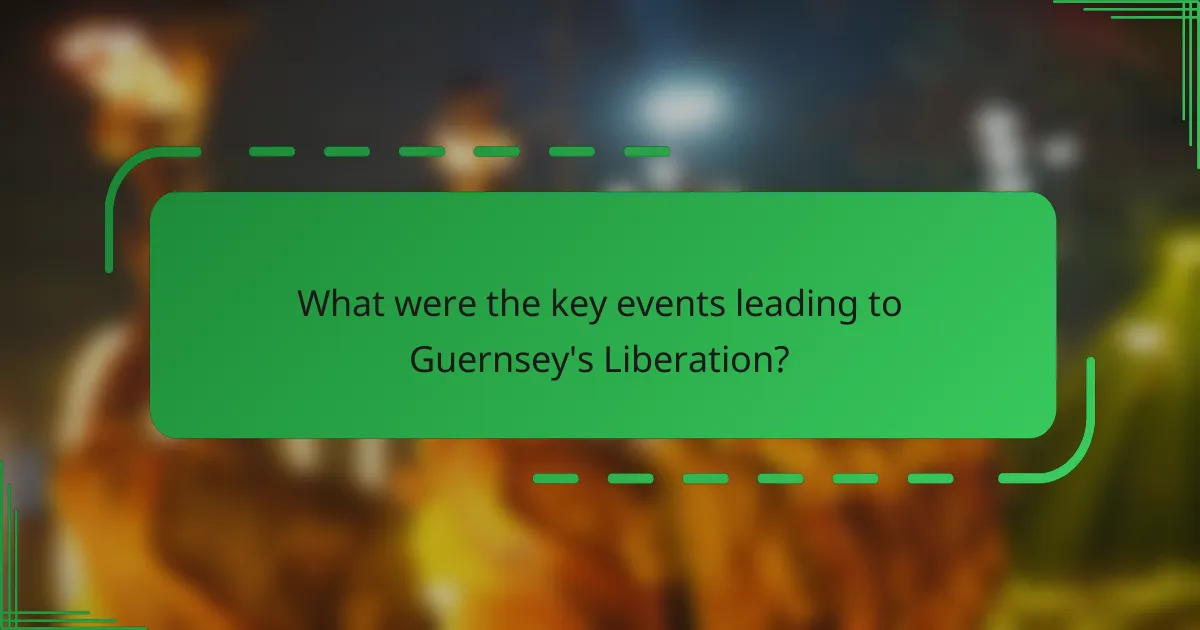
What were the key events leading to Guernsey’s Liberation?
The liberation of Guernsey in May 1945 was the result of a series of significant events, including the German occupation, Allied military strategies, and local resistance efforts. Each of these factors played a crucial role in shaping the conditions that ultimately led to the island’s freedom.
German occupation of Guernsey
The German occupation of Guernsey began in June 1940 and lasted for nearly five years. During this time, the island was subjected to strict military control, with the Germans fortifying the area as part of their Atlantic Wall defense strategy. The local population faced food shortages, forced labor, and restrictions on movement, which created a tense environment.
Throughout the occupation, the German authorities implemented various policies that affected daily life, including censorship and surveillance. These measures aimed to suppress dissent and maintain order, but they also fueled resentment among the islanders.
Allied military strategies
Allied military strategies during World War II included a focus on liberating occupied territories, with Guernsey being a strategic point in the English Channel. The D-Day landings in June 1944 marked a significant turning point, as Allied forces began to push back German troops across Europe. This momentum eventually reached the Channel Islands.
As the Allies advanced, they coordinated efforts to gather intelligence and support local resistance movements. The liberation of Guernsey was planned to coincide with the overall military campaign in Europe, ensuring that the island would not be overlooked in the push against German forces.
Local resistance movements
Local resistance movements in Guernsey played a vital role in undermining German authority during the occupation. These groups engaged in various forms of sabotage, intelligence gathering, and support for Allied forces. Their efforts included distributing anti-German propaganda and assisting escaped prisoners of war.
Despite the risks, these resistance fighters contributed to the overall atmosphere of defiance against the occupiers. Their actions not only provided crucial information to the Allies but also inspired hope among the local population, setting the stage for the eventual liberation of the island.
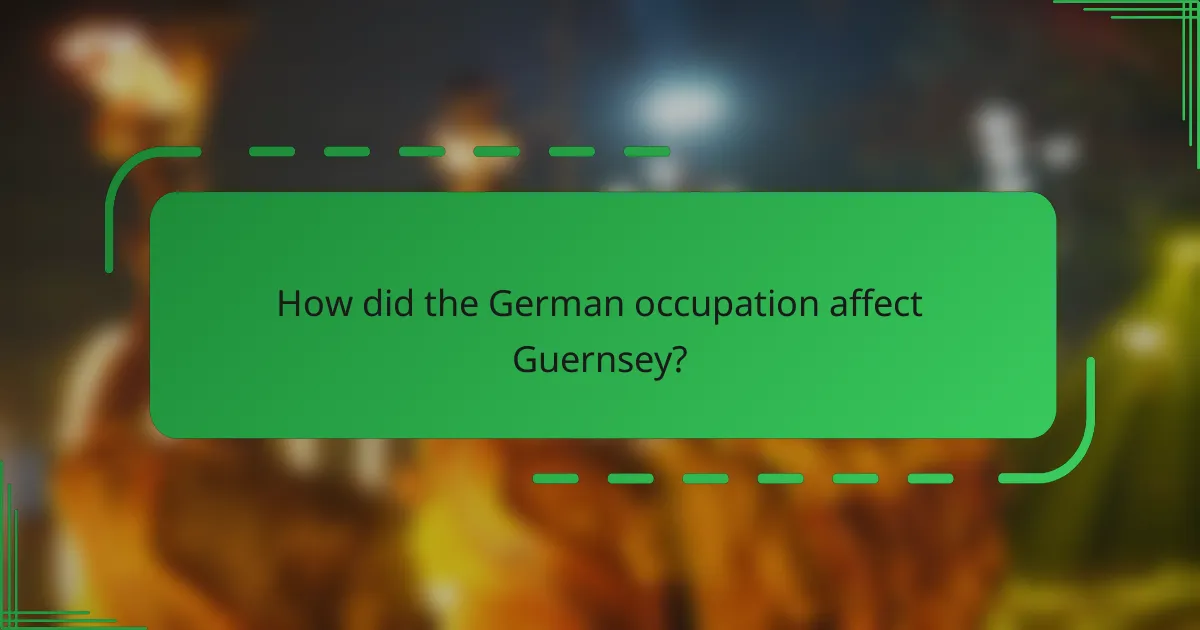
How did the German occupation affect Guernsey?
The German occupation significantly impacted Guernsey, leading to severe economic and social changes. The island faced resource shortages, altered community dynamics, and a lasting legacy that shaped its post-war recovery.
Economic hardships
The German occupation resulted in substantial economic hardships for Guernsey. Food shortages became common as the Germans imposed strict controls on supplies, leading to rationing that affected daily life. Many local businesses struggled to operate under the constraints of the occupation, with some forced to close permanently.
Additionally, the currency was altered, and the introduction of the Reichsmark created confusion and instability in trade. The local economy, heavily reliant on tourism and agriculture, suffered as visitors were discouraged from traveling to the occupied islands.
Social changes
Social changes during the German occupation were profound, as the community had to adapt to new realities. The imposition of curfews and restrictions on movement altered daily routines and limited social interactions. Families were often separated, with some members conscripted for labor or military service.
Moreover, the occupation fostered a climate of fear and suspicion, as collaboration with the occupiers was met with severe consequences. This led to a breakdown of trust within the community, which took years to rebuild after liberation.
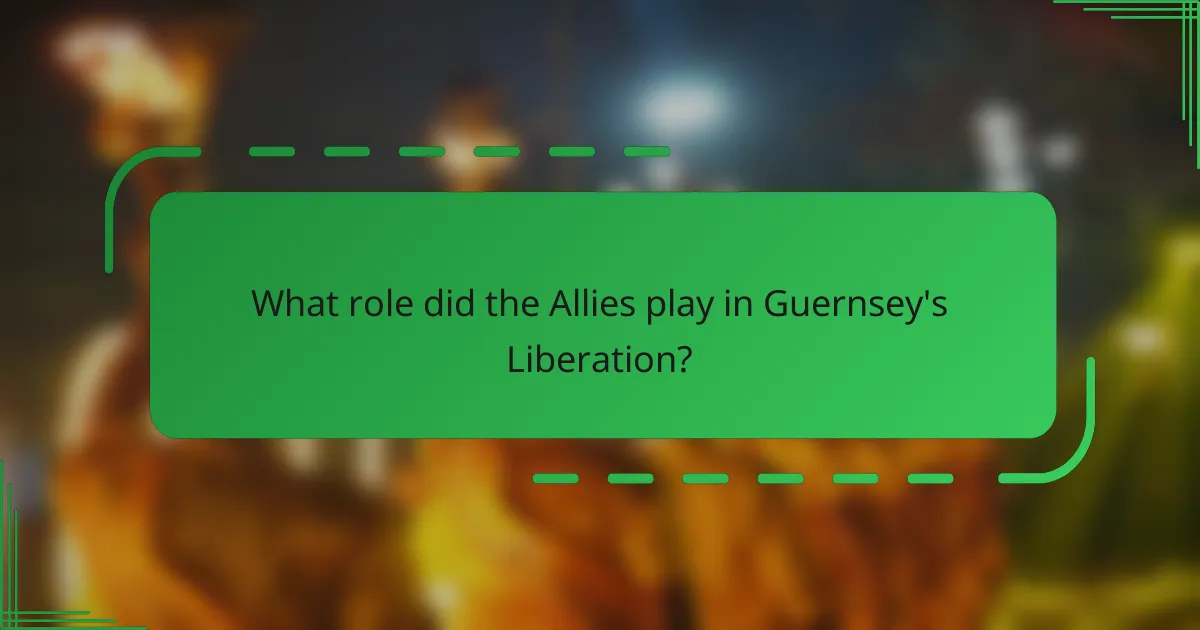
What role did the Allies play in Guernsey’s Liberation?
The Allies played a crucial role in Guernsey’s Liberation by coordinating military efforts and strategic planning that ultimately led to the end of German occupation. Their operations in the Channel Islands, combined with local support, facilitated a successful liberation in May 1945.
Military operations in the Channel Islands
Military operations in the Channel Islands involved careful planning and execution by Allied forces, primarily the British. The liberation was part of a broader strategy to free occupied territories in Europe, with the Channel Islands being a significant target due to their strategic location.
Allied forces conducted air and naval operations to weaken German defenses, which included bombings and blockades. These actions disrupted supply lines and diminished the German military presence, paving the way for ground forces to move in and reclaim the islands.
Support from local populations
Local populations in Guernsey played a vital role in the liberation efforts by providing intelligence and support to Allied forces. Many residents had been living under harsh conditions during the occupation and were eager to assist in any way possible.
This support included sharing information about German troop movements and offering logistical help, which significantly aided the Allies’ military operations. The collaboration between the local population and the Allies was instrumental in ensuring a swift and effective liberation of the islands.
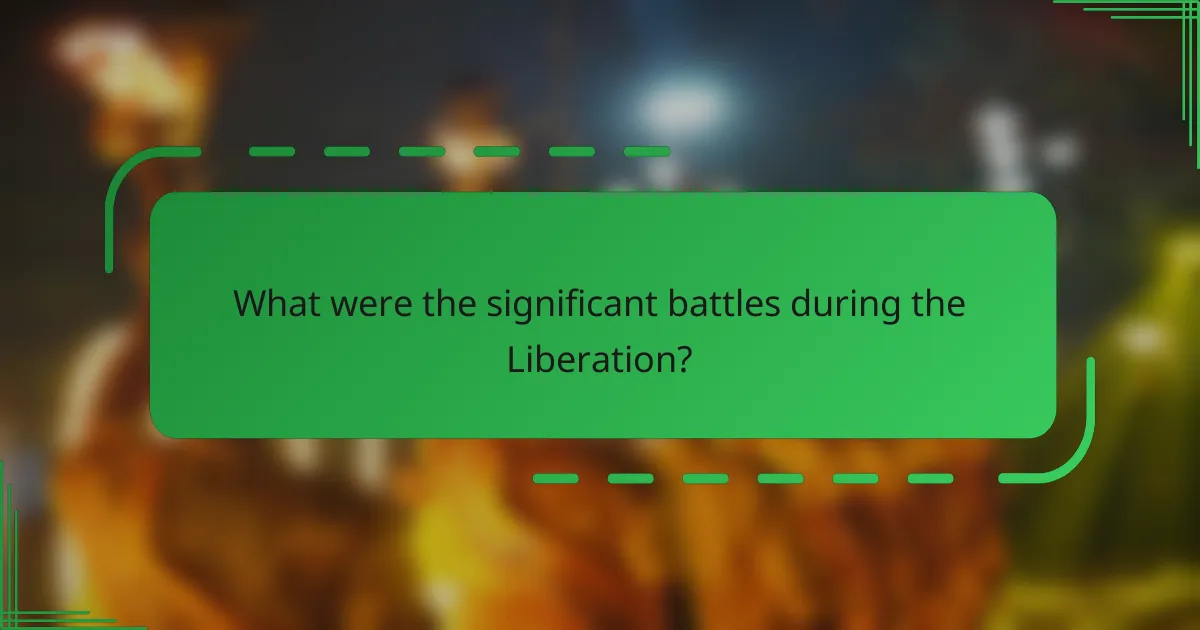
What were the significant battles during the Liberation?
The significant battles leading to Guernsey’s Liberation primarily revolved around the broader context of World War II, particularly the events surrounding the liberation of the Channel Islands from German occupation. Key battles such as those in Normandy and the subsequent Operation Overlord played crucial roles in shaping the outcome for Guernsey.
Battle of Normandy’s impact
The Battle of Normandy, also known as D-Day, began on June 6, 1944, and had a profound impact on the liberation of Guernsey. The successful Allied invasion of Normandy marked the beginning of the end for German forces in Western Europe, creating a ripple effect that reached the Channel Islands.
As Allied troops advanced through France, the German military was forced to divert resources and attention away from the Channel Islands. This shift in focus ultimately weakened their hold on Guernsey and set the stage for liberation efforts.
Operation Overlord
Operation Overlord was the codename for the Allied invasion of Nazi-occupied Europe, commencing with the Battle of Normandy. This operation was pivotal in establishing a foothold in Europe, which directly influenced the liberation of the Channel Islands, including Guernsey.
The success of Operation Overlord not only facilitated the liberation of mainland territories but also encouraged local resistance movements within the Channel Islands. As the Allies gained ground, the likelihood of liberation for Guernsey increased, culminating in its eventual freedom in May 1945.
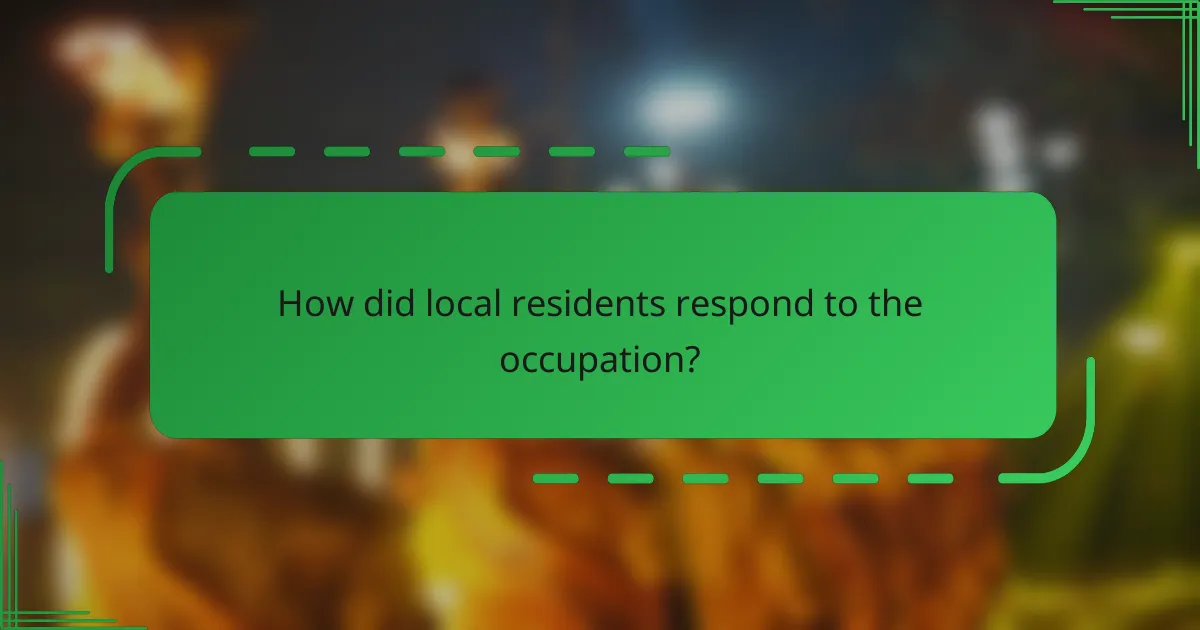
How did local residents respond to the occupation?
Local residents of Guernsey responded to the occupation with a mix of resilience and resistance, often finding ways to cope with the harsh realities imposed by their occupiers. Many engaged in acts of defiance while also supporting one another through community initiatives.
Forms of resistance
Residents employed various forms of resistance against the occupying forces, ranging from passive non-compliance to more active forms of sabotage. Some individuals engaged in clandestine activities, such as smuggling food and supplies to those in need, while others participated in underground movements that aimed to disrupt German operations.
Acts of defiance included graffiti, distributing anti-occupation literature, and organizing secret meetings to discuss strategies for liberation. These actions, though risky, demonstrated a strong spirit of opposition among the local population.
Community solidarity efforts
Community solidarity efforts were crucial during the occupation, as residents banded together to support one another. Local groups formed to share resources, such as food and clothing, which were increasingly scarce due to the occupation’s restrictions.
Additionally, residents organized social gatherings and events to maintain morale and foster a sense of unity. These gatherings served not only as a means of emotional support but also as opportunities to strategize and plan for future resistance efforts against the occupiers.
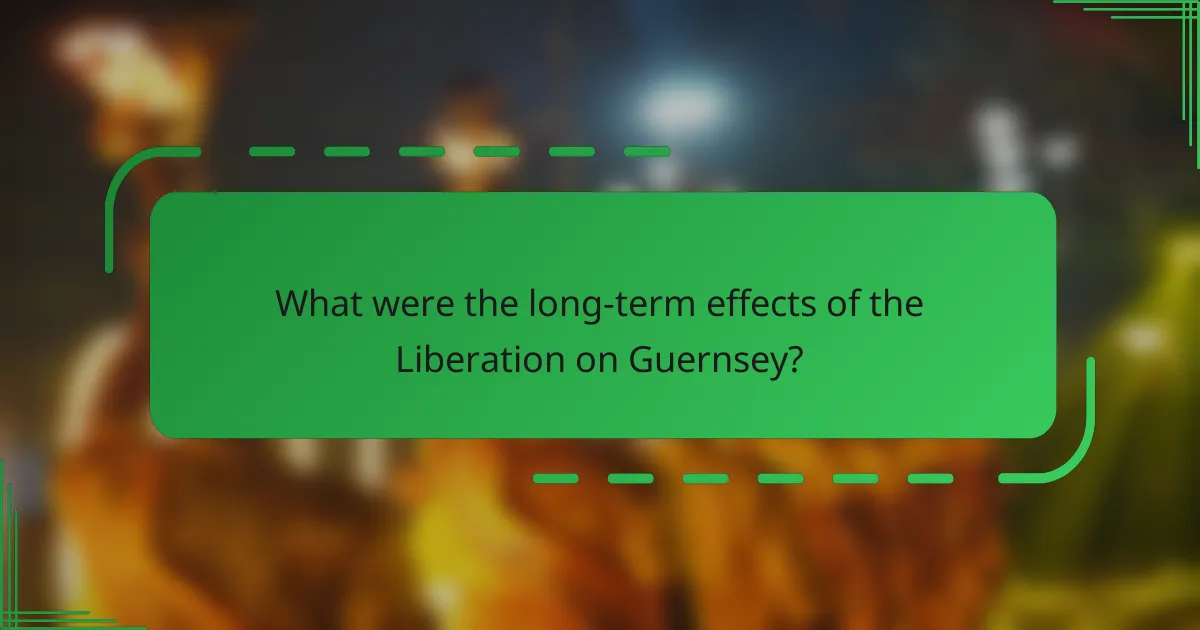
What were the long-term effects of the Liberation on Guernsey?
The Liberation of Guernsey in 1945 had significant long-term effects on the island, shaping its political landscape and economic recovery. These changes have influenced Guernsey’s identity and development in the decades that followed.
Political changes
The Liberation marked a turning point in Guernsey’s political landscape, leading to a stronger sense of local governance and autonomy. Following the end of German occupation, there was a renewed emphasis on democratic processes, resulting in reforms that enhanced the role of the States of Guernsey.
In the years that followed, Guernsey established a more structured political framework, including the introduction of new policies aimed at improving civil rights and community engagement. This shift fostered a greater sense of national identity and pride among the residents.
Economic recovery
The economic recovery of Guernsey post-Liberation was marked by a gradual rebuilding of infrastructure and local businesses. The initial focus was on restoring essential services and reviving the tourism sector, which had been severely impacted during the occupation.
Over the following decades, Guernsey diversified its economy, moving towards finance and services, which became key drivers of growth. The island’s strategic location and favorable tax regime attracted international businesses, significantly boosting its economic resilience and stability.
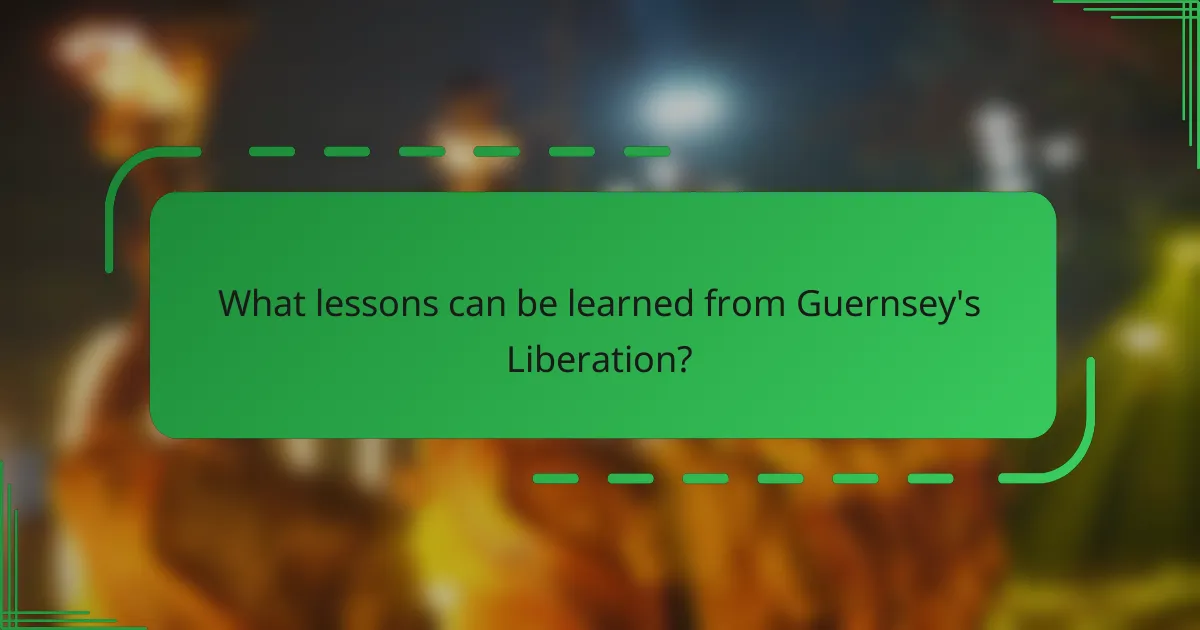
What lessons can be learned from Guernsey’s Liberation?
Guernsey’s Liberation offers valuable insights into resilience, community solidarity, and the importance of historical memory. The events surrounding the liberation highlight the significance of unity and the impact of collective action in overcoming adversity.
Resilience in the Face of Adversity
The experience of Guernsey during the German occupation demonstrates the power of resilience. Islanders adapted to harsh conditions, showcasing their ability to endure and persevere despite significant challenges. This resilience is a crucial lesson for communities facing crises today.
Building resilience involves fostering a strong community spirit and encouraging individuals to support one another. Engaging in local initiatives and maintaining open communication can help strengthen bonds and prepare for future challenges.
The Importance of Community Solidarity
Community solidarity played a vital role in Guernsey’s Liberation. Islanders united to resist oppression, sharing resources and information to support one another. This collective effort underscores the importance of standing together in difficult times.
To cultivate solidarity, communities should prioritize collaboration and mutual aid. Organizing local events and support networks can enhance connections and create a sense of belonging, which is essential during crises.
Historical Memory and Its Impact
Guernsey’s Liberation serves as a reminder of the importance of preserving historical memory. Understanding the past helps inform present actions and decisions, ensuring that the sacrifices made are not forgotten. This awareness can inspire future generations to value freedom and democracy.
Communities can promote historical memory through education and commemorative events. Encouraging discussions about local history and involving younger generations in remembrance activities can help maintain a strong connection to the past.
